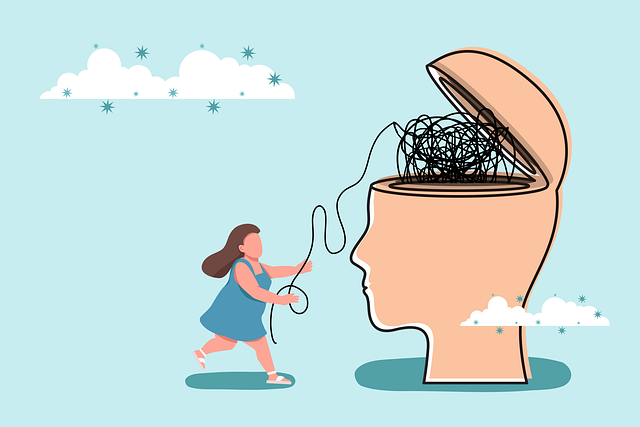In today's fast-paced world, Colorado Springs Couples Counseling Therapy addresses the growing need for mental wellness coaching. These programs teach individuals and couples skills to manage stress, foster positive thinking, and improve relationships through evidence-based practices like compassion cultivation and mood management. Effective therapy integrates personalized and digital delivery methods, reduces stigma, and prevents burnout among coaches. Continuous improvement is driven by advanced evaluation techniques, client feedback, and data analysis, ensuring tailored interventions for better mental health outcomes.
Mental wellness coaching programs are gaining traction as essential tools for personal growth and resilience. This article explores the development of such programs, focusing on Colorado Springs couples counseling therapy as a case study. We delve into understanding the growing demand, designing evidence-based strategies, and implementing effective delivery models.
Through a structured approach, we discuss how to measure success and foster continuous improvement in mental health coaching, ultimately enhancing the well-being of individuals and relationships in our communities.
- Understanding the Need for Mental Wellness Coaching Programs
- Designing Effective Colorado Springs Couples Counseling Therapy Programs
- Implementation and Delivery Strategies for Optimal Results
- Measuring Success and Continuous Improvement in Mental Health Coaching
Understanding the Need for Mental Wellness Coaching Programs

In today’s fast-paced world, mental wellness is an increasingly important aspect of overall health, especially with the rising rates of stress and anxiety across various demographics. This has prompted a growing demand for specialized coaching programs that cater to individuals seeking support for their mental well-being. Colorado Springs Couples Counseling Therapy, for instance, highlights the need for accessible and tailored interventions. With many people facing challenges such as burnout, particularly among healthcare providers, there is a pressing requirement for effective prevention strategies.
Coaching programs focused on mental wellness can offer much-needed guidance and support. These initiatives teach individuals valuable skills to manage stress, foster positive thinking, and apply mind over matter principles in their daily lives. By investing in such programs, communities can empower individuals to take proactive steps towards better mental health, ultimately leading to improved overall well-being and enhanced resilience.
Designing Effective Colorado Springs Couples Counseling Therapy Programs

In designing effective Colorado Springs Couples Counseling Therapy programs, therapists must tailor interventions to address the unique needs of diverse couples. This involves integrating evidence-based practices such as compassion cultivation and mood management techniques into sessions. By fostering a safe, non-judgmental space, therapists can encourage open communication and help partners cultivate empathy, improve conflict resolution skills, and strengthen their emotional connection. Public Awareness Campaigns Development initiatives play a crucial role in promoting these services, ensuring that individuals recognize the importance of seeking counseling when facing relationship challenges.
Through structured programs, therapists can guide couples through various stages of understanding and growth. This may include helping them identify underlying issues, explore patterns of interaction, and develop strategies for managing stress and improving overall well-being. By combining therapeutic techniques with Compassion Cultivation Practices, Colorado Springs Couples Counseling Therapy becomes a transformative journey, enabling partners to build resilience, enhance their bond, and achieve lasting happiness in their relationships.
Implementation and Delivery Strategies for Optimal Results

Implementing a mental wellness coaching program requires careful strategy to ensure optimal results. One effective approach is integrating various delivery methods tailored to individual needs, such as one-on-one sessions, group workshops, and digital platforms. In Colorado Springs, couples counseling therapy has successfully utilized this method to address not only relationship challenges but also mental health concerns. By combining in-person interactions with online resources, coaches can offer flexible support that enhances engagement and improves coping skills development.
Additionally, these programs should focus on reducing the stigma associated with mental illness through educational components and supportive environments. Burnout prevention strategies for healthcare providers are also integral to fostering a healthy coaching culture. Incorporating mindfulness exercises, stress management techniques, and regular check-ins can help coaches maintain their well-being while providing effective services to their clients.
Measuring Success and Continuous Improvement in Mental Health Coaching

Measuring success and fostering continuous improvement are vital components of any effective mental wellness coaching program. In the context of Colorado Springs Couples Counseling Therapy, coaches must employ robust evaluation methods to assess the progress and well-being of their clients. This involves setting clear goals, utilizing evidence-based assessment tools, and regularly gathering feedback from participants to gauge the impact of the coaching sessions. By collecting quantitative and qualitative data, coaches can identify areas of success and pinpoint aspects that require refinement.
For instance, tracking improvements in coping skills development over time or measuring changes in attitudes towards mental illness stigma reduction efforts can provide valuable insights. Additionally, engaging in regular self-reflections and conducting peer evaluations allow coaches to enhance their practices. This continuous improvement cycle ensures that the coaching program remains relevant, adaptable, and aligned with the evolving needs of individuals seeking support, ultimately contributing to positive mental health outcomes.
Mental wellness coaching programs, as exemplified by Colorado Springs Couples Counseling Therapy, are vital tools in promoting individual and collective mental health. By understanding the need, designing effective strategies, and implementing tailored delivery methods, these programs can significantly enhance well-being. Continuous improvement through measured success ensures that these initiatives remain relevant and impactful, fostering a healthier and more resilient community.











